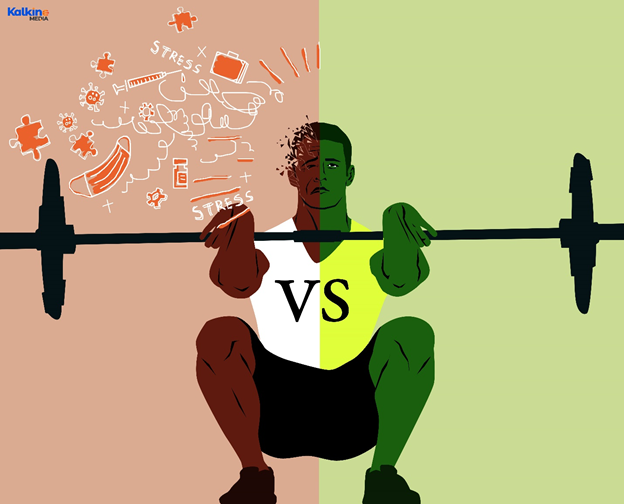Highlights
- Stress is body’s natural defence against any danger that is essential for survival.
- Our body produces various hormones such as cortisol, adrenaline, norepinephrine, and epinephrine that help in improving an individual’s ability to respond to a challenging situation.
- Stress can affect your workout and fitness as it slows down recovery, increase Cortisol level in body, making it difficult to lose weight.
Stress is a natural human feeling of being overwhelmed or unable to cope up with specific demands and events. However, if stress is not managed timely it can become a chronic condition. Anything that poses a real or perceived challenge or threat such as work, financial pressure, mental and emotional pressure, relationships and other situations to the health of an individual can cause stress.
Anything that poses a real or perceived challenge or threat, like work, financial pressure, mental and emotional pressure, relationships, and others to the health of an individual can cause stress.
It’s difficult to avoid stress and it has a serious effect on our workout. But if you exercise or workout regularly, it can be an incredible stress reliever as it boosts your endorphin levels and releases the “feel-good” hormones.
Doing a high-intensity workout when you are too stressed can erode all your efforts as mental stress can negatively affect physical performance. Muscles and cognition are controlled by cingulated cortex and if brain is already in fatigue before you even start workout, there’s a good chance your muscles may be too.
Also read: When stress is good for you
What is Stress?
Stress is the body’s natural defence against any danger and predators. It causes a release of hormones that signals the brain to evade or confront danger, which is generally known as fight-or-flight mechanism.
Our body produces various chemicals such as cortisol, adrenaline, norepinephrine, and epinephrine that trigger the physical reactions such as increased blood pressure, sweating, heightened muscle preparedness and alertness. All these reactions help in improving an individual’s ability to respond to a challenging situation. Stress slows down normal body functions such as immune systems performance and the digestive system.

Source: Copyright © 2021 Kalkine Media
All these physical reactions help in improving an individual’s ability to respond to a challenging situation. Our body reacts in the following ways due to stress:
- digestive system slows down
- muscles become more tense
- Blood pressure and pulse rise
- sleepiness decreases due to a heightened state of alertness
- breathing speeds up
- immune activity decreases
- make it easier for muscles to use glucose
While body chemicals are helpful but frequent increase may lead to:
- Anxiety and depression
- Damage blood vessels
- Higher risk of heart attack and stroke
- Insomnia
- Headaches
- High blood pressure or hypertension
- Weight gain
- Osteoporosis
- Lack of energy
- Mental cloudiness and memory problems
- Weak immune system
- Pain in the back or chest
- Cramps or muscle spasms
Also read: Dealing with existential angst? Now you can control it!
Types of Stress
- Acute Stress
Acute Stress is for short term and usually the more common form of stress, which do not cause long-term damages as chronic stress does. It usually occurs when an individual consider the pressure of events that has recently happened or face upcoming challenges in the near future.
Acute stressors are often new and often have immediate solutions. However, this type of stress reduces or disappears once it is solved.
But, repeated instances of acute stress may need medical attention as it may become chronic and harmful.
- Chronic Stress
Chronic stress develops over a long period and is more harmful for a person’s mental and physical health. These types of stress occur when a person can find no solutions to avoid their stressors and stops looking for solutions. It makes it difficult for body to return to a normal level of stress hormone activity which leads to problems of respiratory, cardiovascular, immune, reproduction and sleep. It may also increase the risk of type 2 diabetes, health diseases and blood pressure and anxiety, depression and other mental health disorders may be developed when stress become chronic.
Also read: What is Electric Sleep?
So, how stress affects your workout and fitness
Stress may distract your mind, skew your confidence, and overwhelm your body. You may have a hard time reaching your fitness goals when you are distracted.
Stress makes you feel sore after a workout as your muscles are stressed due to various reasons. The mental stress makes you feel tired all the time. Sometimes, a tough workout may lead to serious injuries.
Stress affects the part of your brain that deals with both short and long-term memory. This makes a simple and easy work more difficult and makes you feel mentally and physically tired faster.
Extremely high level of stress hormones such as cortisol and adrenaline can cause blurry vision and disrupt hand-eye coordination.
High level of stress hormones such as Cortisol encourages insulin production which could result in sugar cravings and slow down metabolism, hence making you gain weight.
Also read: How crystal botany is linked to wellness
Bottomline
While stress is bad for your mental and physical health, but it can also motivate you. A slight increase in Cortisol hormones from moderate stress may have positive impact on your performance. So rather than looking at stress as an obstacle to your success, you may just start taking it as a challenge that you can overcome with some efforts.
Best way to deal with stress is to practice mindfulness with exercise. So, you should take rest days and mix up your routine with yoga and meditation.



